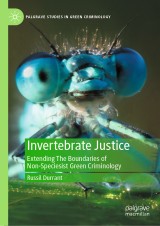Details

Invertebrate Justice
Extending The Boundaries of Non-Speciesist Green CriminologyPalgrave Studies in Green Criminology
|
CHF 153.50 |
|
| Verlag: | Palgrave Macmillan |
| Format: | |
| Veröffentl.: | 19.07.2024 |
| ISBN/EAN: | 9783031644436 |
| Sprache: | englisch |
| Anzahl Seiten: | 250 |
Dieses eBook enthält ein Wasserzeichen.
Beschreibungen
<p>Invertebrates are the neglected majority of the animal world. Even though they make up over 95% of animal life, they rarely feature in discussions of speciesism, animal ethics or species justice. This book aims to extend the work of non-speciesist criminologists to argue for the idea of ‘invertebrate justice’. Utilizing green criminologist Rob White’s (2013) eco-justice perspective, the book demonstrates how our interactions with invertebrate species (insects, crustaceans, molluscs and so forth) cause a significant amount of harm to those animals themselves (species justice), the ecosystems in which they are embedded (ecological justice), and ultimately to humans (environmental justice). Across three sections, it provides an overview of the ways in which humans and invertebrates interact across a diverse range of contexts and reviews the literature on both invertebrate biodiversity and invertebrate sentience; builds a theoretical framework that can help us understand what invertebrate justice might mean; and tackles the difficult question of how best we can promote invertebrate justice in the future. It appeals to academics, environmental scientists, activists and policymakers.</p>
<p>1 Introduction.- Part One: The Invertebrates world.- 2 Human-invertebrate relationships: An historical overview.- 3 So many species: The nature and scope of invertebrate life and the biodiversity crises.- 4 What is like to be a cockroach? Exploring invertebrate sentience.- Part Two: An Outline of Invertebrate Justice.- 5 Non-speciesist green criminology – An eco-justice perspective.- 6 Species justice and harm to invertebrates.- 7 Ecological justice and harm to nature.- 8 Environmental justice and harm to humans.- 9 Trade-offs, complexities, and challenges.- Part Three: Doing Invertebrate Justice in the Real World.- 10 The Yuck factor: psychological, social, and institutional barriers to obtaining invertebrate justice.- 11 Realising Invertebrate Justice 1: Psychological, social, and cultural changes.- 12 Realising Invertebrate Justice 2: Institutional and legal changes.-13 Conclusions.</p>
<p>Russil Durrant is Senior Lecturer in Criminology at the Institute of Criminology, Victoria University of Wellington, New Zealand/Aotearoa. His research interests range over a number of different subject areas including green criminology, species justice, the global food system, criminal and forensic psychology, and evolutionary behavioural science. He is the author or co-author of four previous books.</p>
<p>Invertebrates are the neglected majority of the animal world. Even though they make up over 95% of animal life, they rarely feature in discussions of speciesism, animal ethics or species justice. This book aims to extend the work of non-speciesist criminologists to argue for the idea of ‘invertebrate justice’. Utilizing green criminologist Rob White’s (2013) eco-justice perspective, the book demonstrates how our interactions with invertebrate species (insects, crustaceans, molluscs and so forth) cause a significant amount of harm to those animals themselves (species justice), the ecosystems in which they are embedded (ecological justice), and ultimately to humans (environmental justice). Across three sections, it provides an overview of the ways in which humans and invertebrates interact across a diverse range of contexts and reviews the literature on both invertebrate biodiversity and invertebrate sentience; builds a theoretical framework that can help us understand what invertebrate justice might mean; and tackles the difficult question of how best we can promote invertebrate justice in the future. It appeals to academics, environmental scientists, activists and policymakers.</p>
<p><strong>Russil Durrant</strong> is Senior Lecturer in Criminology at the Institute of Criminology, Victoria University of Wellington, New Zealand/Aotearoa. His research interests range over a number of different subject areas including green criminology, species justice, the global food system, criminal and forensic psychology, and evolutionary behavioural science. He is the author or co-author of four previous books.</p>
<p><strong>Russil Durrant</strong> is Senior Lecturer in Criminology at the Institute of Criminology, Victoria University of Wellington, New Zealand/Aotearoa. His research interests range over a number of different subject areas including green criminology, species justice, the global food system, criminal and forensic psychology, and evolutionary behavioural science. He is the author or co-author of four previous books.</p>
Speaks to green criminologists, moral and political philosophers, and social and behavioural scientists Presents an insightful, novel and thought-provoking argument Draws on draws upon critical animal studies and other disciplines

















